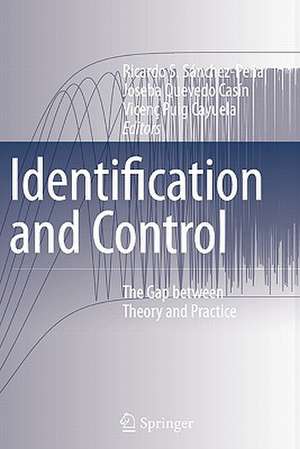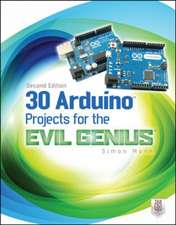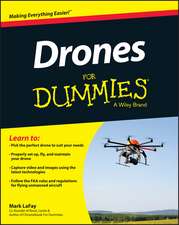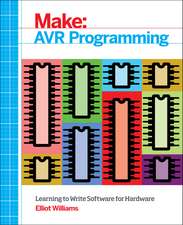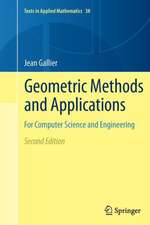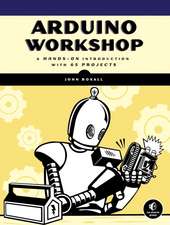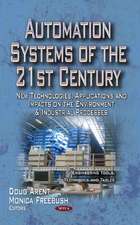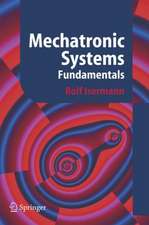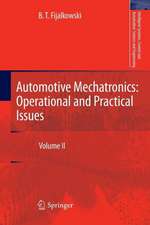Identification and Control: The Gap between Theory and Practice
Editat de Ricardo S. Sánchez-Peña, Joseba Quevedo Casín, Vicenç Puig Cayuelaen Limba Engleză Paperback – 13 oct 2010
| Toate formatele și edițiile | Preț | Express |
|---|---|---|
| Paperback (1) | 642.83 lei 6-8 săpt. | |
| SPRINGER LONDON – 13 oct 2010 | 642.83 lei 6-8 săpt. | |
| Hardback (1) | 650.55 lei 6-8 săpt. | |
| SPRINGER LONDON – 3 iul 2007 | 650.55 lei 6-8 săpt. |
Preț: 642.83 lei
Preț vechi: 756.27 lei
-15% Nou
Puncte Express: 964
Preț estimativ în valută:
123.01€ • 128.75$ • 102.38£
123.01€ • 128.75$ • 102.38£
Carte tipărită la comandă
Livrare economică 31 martie-14 aprilie
Preluare comenzi: 021 569.72.76
Specificații
ISBN-13: 9781849966702
ISBN-10: 1849966702
Pagini: 348
Ilustrații: XVI, 330 p. 187 illus.
Dimensiuni: 155 x 235 x 18 mm
Greutate: 0.49 kg
Ediția:Softcover reprint of hardcover 1st ed. 2007
Editura: SPRINGER LONDON
Colecția Springer
Locul publicării:London, United Kingdom
ISBN-10: 1849966702
Pagini: 348
Ilustrații: XVI, 330 p. 187 illus.
Dimensiuni: 155 x 235 x 18 mm
Greutate: 0.49 kg
Ediția:Softcover reprint of hardcover 1st ed. 2007
Editura: SPRINGER LONDON
Colecția Springer
Locul publicării:London, United Kingdom
Public țintă
ResearchCuprins
Large-scale Problems.- Identification and Control of Polymerization Reactors.- Open-cut Mine Planning via Closed-loop Receding-horizon Optimal Control.- Energy Saving in a Copper Smelter by means of Model Predictive Control.- On Hybrid Model Predictive Control of Sewer Networks.- Aerospace.- Nonlinear System Identification of Aeroelastic Systems: A Structure-detection Approach.- Modeling and Control of Flexible Structures in Frequency Domain.- Vision and Sound.- Robust Identification and Model (In)Validation of Active-vision Systems.- Identification and Control Structure Design in Active (Acoustic) Noise Control.- Electromechanical.- Iterative Identification and Control Design: Methodology and Applications.- Classical, Robust and LPV Control of a Magnetic-bearing Experiment.
Notă biografică
Ricardo S. Sánchez Peña has worked for several research institutions in Argentina (CITEFA, CNIE, CNEA) and since 2004 he has worked at the Advanced Control Systems group, Polytechnic University of Catalunya (Barcelona, Spain), first as a Ramon y Cajal fellow and presently as ICREA research professor. His research interests are in the applications of robust identification and control to practical problems.
He has been invited as a researcher by the German Space Agency (DLR, May/Aug’79), CalTech (Jun/Jul’89), the Interdisciplinary Center for Applied Mathematics (ICAM) at the Virginia Polytechnic Institute and State University (Aug/Sept’91), and the Electrical Engineering Department of Pennsylvania State University (Dec’94andJul’96). He lectured courses at the School of Aeronautics and Astronautics of Purdue University (Feb/Mar’01) as Visiting Full Professor, at DISA-Polytechnic University of Valencia (Jun/Jul’02) and seminars at UNED (Madrid), the Polytechnic University of Catalunya (Jul’02) and the Universidad Mayor (Uruguay’93).
Doctor Sánchez Peña is the author of Introducción a la Teoría de Control Robusto (AADECA, 1992, 2nd.Ed. 1999), winner of the 1991 Book contest organized by the argentine IFAC representative, and co–author (with Dr. Mario Sznaier) of Robust Systems Theory and Applications (John Wiley and Sons 1998) and the Robust Systems chapter in the CRC Electrical Engineering Handbook (1999). He has authored around 100 journal and conference papers. He is Associate Editor of the Journal of Control Science and Engineering. He is a Corresponding Member of the International Academy of Astronautics, Senior Member of IEEE and AIAA, member of the Policy Committee of IFAC and of the Independent Review Team of the NASA/CONAE satellite Aquarius/SAC-D. He participated as a Technical expert in UNMOVIC (UnitedNations) during 2001 and 2002 and was also argentine representative at the TechnicalExperts Meetings for the MTCR from 2000 to 2004.
Professor Joseba Quevedo Casín has published 2 books, 7 chapters in books (published by Springer-Verlag and Elsevier) and more than 25 articles in international and national journals (IEE Intelligent Systems Engineering, Control Engineering Practice and Computing and Control Engineering Journal). He has made more than 80 presentations in international and national Congresses, Conferences and Workshops and has participated in 5 international committees and representations as a member or President. Joseba Quevedo Casín has organized 3 international research and development activities (Workshops or Vacation Schools) and presently he is Project Assessor of the Science and Technology Commission of the Spanish government.
Professor Vicenç Puig teaches "Automatic Control" and "Computer Control" in the Industrial Engineering degree at Barcelona Industrial Engineering School and "Optimization and Optimal Control" in the Automatic Engineering degree at Terrassa Industrial Engineering School. He has also been responsible for the PhD Program in "Control, Vision and Robotics" of UPC since 2002. He also teaches in the PhD program "Fault Diagnosis and Fault Tolerant Control in Industrial Processes" and is responsible of the Doctoral Spanish School in Fault Diagnosis that has started this year as an inter University PhD program. He is also the leader of the "Control and Supervision" group that belongs to the "Advanced Control Systems" line of research directed by Professor Joseba Quevedo.
He has been invited as a researcher by the German Space Agency (DLR, May/Aug’79), CalTech (Jun/Jul’89), the Interdisciplinary Center for Applied Mathematics (ICAM) at the Virginia Polytechnic Institute and State University (Aug/Sept’91), and the Electrical Engineering Department of Pennsylvania State University (Dec’94andJul’96). He lectured courses at the School of Aeronautics and Astronautics of Purdue University (Feb/Mar’01) as Visiting Full Professor, at DISA-Polytechnic University of Valencia (Jun/Jul’02) and seminars at UNED (Madrid), the Polytechnic University of Catalunya (Jul’02) and the Universidad Mayor (Uruguay’93).
Doctor Sánchez Peña is the author of Introducción a la Teoría de Control Robusto (AADECA, 1992, 2nd.Ed. 1999), winner of the 1991 Book contest organized by the argentine IFAC representative, and co–author (with Dr. Mario Sznaier) of Robust Systems Theory and Applications (John Wiley and Sons 1998) and the Robust Systems chapter in the CRC Electrical Engineering Handbook (1999). He has authored around 100 journal and conference papers. He is Associate Editor of the Journal of Control Science and Engineering. He is a Corresponding Member of the International Academy of Astronautics, Senior Member of IEEE and AIAA, member of the Policy Committee of IFAC and of the Independent Review Team of the NASA/CONAE satellite Aquarius/SAC-D. He participated as a Technical expert in UNMOVIC (UnitedNations) during 2001 and 2002 and was also argentine representative at the TechnicalExperts Meetings for the MTCR from 2000 to 2004.
Professor Joseba Quevedo Casín has published 2 books, 7 chapters in books (published by Springer-Verlag and Elsevier) and more than 25 articles in international and national journals (IEE Intelligent Systems Engineering, Control Engineering Practice and Computing and Control Engineering Journal). He has made more than 80 presentations in international and national Congresses, Conferences and Workshops and has participated in 5 international committees and representations as a member or President. Joseba Quevedo Casín has organized 3 international research and development activities (Workshops or Vacation Schools) and presently he is Project Assessor of the Science and Technology Commission of the Spanish government.
Professor Vicenç Puig teaches "Automatic Control" and "Computer Control" in the Industrial Engineering degree at Barcelona Industrial Engineering School and "Optimization and Optimal Control" in the Automatic Engineering degree at Terrassa Industrial Engineering School. He has also been responsible for the PhD Program in "Control, Vision and Robotics" of UPC since 2002. He also teaches in the PhD program "Fault Diagnosis and Fault Tolerant Control in Industrial Processes" and is responsible of the Doctoral Spanish School in Fault Diagnosis that has started this year as an inter University PhD program. He is also the leader of the "Control and Supervision" group that belongs to the "Advanced Control Systems" line of research directed by Professor Joseba Quevedo.
Textul de pe ultima copertă
While automatic control and system identification have evolved very rapidly in recent years, there is still an important disjunction between the ideas in theoretical texts and what goes on in real plant. There are very few, if any, situations in which "out-of-the-box" theory fits practical application without simplification and adjustment. This mismatch is important, especially in safety-critical applications and is usually compensated by extensive simulation and/or experimental testing.
Identification and Control meets the difficulty of making practical use of new systems theory head on, presenting a selection of varied applications together with relevant theory. The highly-experienced groups of researchers and engineers contributing to this volume show how workable identification and control solutions can be derived by adapting and extrapolating from the theory. Each chapter has a common structure: a brief presentation of theory, extensively cited throughout the chapter; the description of a particular application; experimental results; and a final section highlighting, explaining and laying out solutions to the discrepancy between the theoretical and the practical.
The extensive list of applications used as examples includes: mine planning, suspension polymerization, copper founding, magnetic bearings, electromechanical systems, aircraft flight, active noise control, sewer networks, flexible structures, active suspension and active vision.
Identification and Control faces a well-known but often-evaded problem squarely and helps it readers to prevail against it. This collection is written for researchers interested in the application of control theory and for engineers who want to make use of new ideas in identification and control.
Identification and Control meets the difficulty of making practical use of new systems theory head on, presenting a selection of varied applications together with relevant theory. The highly-experienced groups of researchers and engineers contributing to this volume show how workable identification and control solutions can be derived by adapting and extrapolating from the theory. Each chapter has a common structure: a brief presentation of theory, extensively cited throughout the chapter; the description of a particular application; experimental results; and a final section highlighting, explaining and laying out solutions to the discrepancy between the theoretical and the practical.
The extensive list of applications used as examples includes: mine planning, suspension polymerization, copper founding, magnetic bearings, electromechanical systems, aircraft flight, active noise control, sewer networks, flexible structures, active suspension and active vision.
Identification and Control faces a well-known but often-evaded problem squarely and helps it readers to prevail against it. This collection is written for researchers interested in the application of control theory and for engineers who want to make use of new ideas in identification and control.
Caracteristici
Provides the reader with guidance in circumventing the well-known divide between control-theoretic advancements and what is actually useful in practice Covers a diverse spectrum of theoretical approaches and possible applications Contributors include many well-known luminaries in the field from both practical and theoretical backgrounds Includes supplementary material: sn.pub/extras
